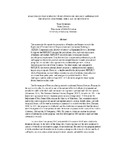Analysis of participants’ perceptions of REFLECT approach in their lives and work: the case of Botswana

View/
Date
2008Author
Maruatona, T.
Publisher
Florida International University, http://education.fiu.edu/newhorizonsLink
http://education.fiu.edu/newhorizons/journals/New%20Horizons%20in%20AEHRD%2022%283-4%29%20Issue.pdfType
Published ArticleMetadata
Show full item recordAbstract
This manuscript documents the perceptions of teachers and learners towards the
Regenerated Freirean Literacy Empowerment and Community Techniques
(REFLECT) approach in the delivery of literacy in Ngamiland District, Botswana. It suggests that REFLECT changed the perceptions, lives, and work experiences
of learners and teachers. REFLECT caused teachers to recognize learners’
knowledge and experiences. It enabled teachers to experience professional growth
and engage in democratic practices and encouraged learners to make personal and
group choices and take action against certain undesirable practices, such as
alcoholism and the sale of beer to minors. The study argues that, compared to REFLECT, the current national literacy program is centralized and has minimal impact on participants. However, as implemented in the pilot project, REFLECT also had limitations, such as failing to generate practical solutions, demanding too
much time from participants, and using poorly qualified teachers. These challenges could be addressed and REFLECT should be adopted to train regular literacy teachers nation-wide.
